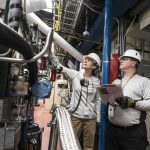Jump To:
Resources
Author Info
Kelly Bitner
Lead Environmental Specialist
MACTEC, Inc.
2309 Renard Place SE, Suite 103
Albuquerque, NM 87106
E-mail: kellybitner@MACTEC-nm.com
505-242-7524
What is an environmental scientist?
An environmental scientist works to prevent contamination of the environment. In some cases this means keeping contamination from reaching the environment in the first place, and in other cases it means cleaning up contamination that has been released to the environment. Just about every industry in the world creates waste products. Before there were laws and regulations governing the disposal of these waste products, the waste was disposed of in the environment—on land, in surface water, or in groundwater. In these old disposal areas, the waste products that could pose a risk to humans or to the plants and animals in the environment must be cleaned up. With the establishment of laws and regulations governing where waste products can be disposed of, most industries use environmental scientists to find ways to minimize and recycle the waste they produce.
What makes a good environmental scientist?
Good environmental scientists have a desire to clean the environment so that it is safe for people, animals, and plants to live in. In order to do this, environmental scientists must have a good understanding of one or more of the many branches of science (e.g., hydrology, chemistry, biology, toxicology, and engineering) that must be applied to the problems of cleaning up contaminants in the environment or preventing them from entering the environment. Because one person cannot be an expert in all of the sciences, a good environmental scientist must be able to work well in teams made of people with different backgrounds. They must also be able to communicate well, both in large and small groups and in written form.
Environmental scientists must enjoy working outdoors. Often this type of work requires collecting samples from the environment to test them for contamination. Depending on the specialty of the environmental scientist, she may have to collect samples (or observe or map) the soil, water, vegetation, or animals. Once the samples have been collected and the testing is done, the environmental scientist must analyze the information to decide how best to clean up the site. This analysis generally involves using computers to model or predict where the contamination will go.
Finally, a good environmental scientist must be able to understand the environmental laws and regulations, particularly how they apply to the specific problem that is being worked on.
What is life as an environmental scientist like?
Environmental scientists generally have a good balance between outdoor work and office work. There is a great deal of satisfaction in collecting data and then analyzing it to develop conclusions based on scientific principles. This is particularly true when working in a team, where all the team members contribute ideas and perspectives from their own experiences. This can be a very intellectually stimulating environment. The greatest feeling for an environmental scientist is finishing the cleanup of a contaminated site, knowing it is safe for people and the environment.
How do I become an environmental scientist?
Environmental scientists come from a broad range of educational backgrounds because it takes people from many scientific disciplines to figure out how to clean up a contaminated area. To become an environmental scientist, you should take as many math, science, and communication classes in high school as possible. Important areas to study are chemistry, physics, biology, trigonometry, algebra, and calculus. In college, your undergraduate education should be broad and include some courses in many different sciences including geology, geography, computer science, engineering, technical writing, statistics, calculus, biological sciences, chemistry, and physics. A graduate degree is strongly recommended for environmental scientists, and during graduate studies is the time to choose a discipline to specialize in.
What/where are the jobs?
Environmental scientists work in both the private and public sectors. In the private sector there are consulting firms that contract with both industry and government to conduct environmental investigations and cleanup. Some private firms specialize in areas such as the cleanup of leaking underground storage tanks or cleaning up groundwater that is contaminated. In the public sector, there are jobs as regulators with cities (Albuquerque Environmental Health Department, the State (New Mexico Environment Department), or the Federal government (Environmental Protection Agency). The regulators watch over industry and contractors to make sure all their work is in compliance with laws and regulations. Other federal agencies, such as the Department of Energy or Department of Defense hire environmental scientists to mange the cleanup of contamination on their property.


